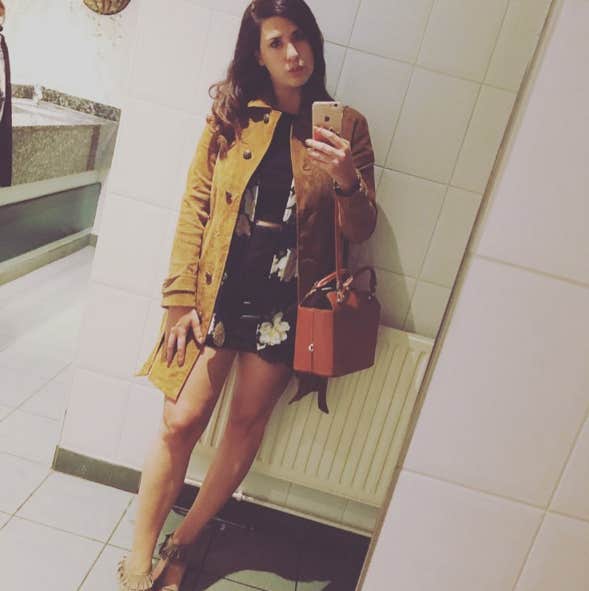I Thought My BFF Was Fun & Bossy — But She Was A Secret Narcissist
She saw right through me — back to herself.
 Courtesy of the Author
Courtesy of the Author Once, many years ago, I met a beautiful, talented woman who swiftly became a friend of mine. She was like me: interested in poetry, people, art and ideas. She was fun, but we could also sit in (relative) silence. It felt natural.
I admired her dedication to her work and art and I thought of her, in a way, as a mentor. In that way that little girls look up to older girls — and this was probably because I was still a young 20-something. Impressionable. Interested in finding new friends.
Explorative. Slightly insecure. I was the perfect person for someone to scoop up and mold.
She was slightly older than me, fashionable, bold and ... entitled. But I liked this about her, the way she could command a room just by walking in. The way she was just memorable enough without being an attention-guzzling maniac.
The way she expected people to do what she wanted or needed them to do because she was lazy, or busy, or "being creative."

Photo: Courtesy of author
She'd literally ask her friends to get food for her because she was "in the middle of writing." It was always couched in a whiny "Pllllleeeeaseeee, I'll love you forever" voice, as if you had to earn her love by doing work. It was at once disgusting and alluring. I wanted to be like her... sort of. Except I couldn't find it in me to care so little about others.
But what I realized was that she wasn't like me because there was a real lack of empathy there — a sort of sociopathic resistance to compassion and a lack of genuine interest in others' talents, achievements, ideas or feelings. What I'd mistaken for charisma was really a pattern of narcissism, designed to feed her ego or protect her from the idea that she wasn't enough. That was sad. But that wasn't all.
1. She was obsessed with herself.
We'd be walking down a gorgeous NYC street and she'd be looking in every single window reflection, assessing herself. Instead of the sky, or the park, or the people — or anything — it was herself she'd fixate on.
I had decided this to be some sort of insecurity (understandable) or maybe even a healthy admiration (I guess that's OK?), but after awhile, it became impossible to even dine with her where a mirror or window was, as her reflection was always dining with us. She needed to talk about her looks, talk about her body in relation to others', compare herself to others and talk herself up.
Most women battle with body image issues, and this was that — mixed with a self-aggrandizing obsession. This was a friend-to-friend dialogue about body issues; it was just a blank, "I'm awesome and I want to look at myself." Who knows what it was underneath the surface. And this made me feel insecure, like maybe I was in the wrong body if I didn't look like her.
2. She knew what was right for me and wouldn't let me share my own thoughts.
When she knew I was upset about a deeply personal and very painful family situation, she'd try and school me on why I should or shouldn't feel a certain way. My estranged father was just "a dirtbag," and I was better off without him, despite my clear interest in reconnecting. My newest book would be better without X or Y.
She'd try to teach me how to do skills I knew how to do. Whether it was subtle or overt, there was always this sense that she needed to be right, I needed to learn from her (again, the "mentor" gone woefully awry), and that she could guide me toward all the right choices.
There was no listening, no asking what I thought, no desire to help me work through my own ideas. If it was my pain, it was her story. And god forbid I made the choice she suggested — then she was my actual savior.
3. She was convinced everyone was jealous of her.
Women can smell jealousy. We breed it, we feel it and we, unfortunately, act on it. It's a problem. But there's a difference between understanding the language of jealousy in the female world and calling the "jealousy card" whenever something doesn't go your way. She'd do this, over and over again.

Photo: Courtesy of author
Once, we had a mutual friend. This mutual friend was hiring writers for a gig. When my friend didn't get the gig, it was because the hiring manager was "jealous." She'd say things like, "Obviously it's because she's not happy with herself. I mean, look at her. I put her on edge." In my friends' eyes, it couldn't be that she just wasn't the right fit. It had to be a jealousy thing, projected onto the other person.
This happened so many times that I learned to expect it. Mostly, it was painful seeing my narcissistic friend justify why she wasn't "good enough" by putting it onto someone else. This is a deeply f*cked up pattern of behavior that feeds on itself, and if no one calls it out, it will keep going. I never called it out and it kept going. If I did, I'm sure she'd think I was jealous of her as well.
4. She knew everyone and everyone knew her.
It didn't matter who you knew or what you could offer. It was about what she could offer. That actor she met once. That guy who worked at the door of the club. The head of an organization. And it was all about how she could get these people to give us something. Because she needed to be seen as offering something up, and that was seen as powerful.
She met a musician, she had dinner with "that guy from that TV show," and she met "the head of the company." I could never get an edge in, word-wise. It didn't matter if I didn't want to even meet these people. They were supposed to make her look good. And I was supposed to need her because of it.
5. It became clear she actually was an attention-guzzling maniac.
She just didn't do it in obvious ways. She was an energy vampire, silently preying. Talking over people, telling people at a house party to leave and come to her "much nicer" apartment. Ensuring she was given credit for anyone's work.
The reality is that I had no clue this person was a narcissist. I thought she was smart, capable, opinionated, assertive and feminist. I thought she didn't take crap and I could learn a thing or two.

Photo: Courtesy of author
But fatigue sets in; with people like this, you are constantly coddling their ego so they don't lash out at you. You have to indulge their stories. You have to agree with them — or else. It's toxic, tiring, and hurtful, especially because you're expected to be a mirror — to show their reflection, to absorb their words and stories, and to nod your head yes. It doesn't matter what you think.
In the end, we parted ways. I still miss her personality and her vitality. But I could never be friends with someone who saw right through me — right back to herself, even again.
Lisa Marie Basile is the author of Light Magic for Dark Times, Wordcraft Witchery forthcoming, 2020), a collection of poetry, Nympholepsy, as well as the editor-in-chief of Luna Luna Magazine. Her work encounters self-care, trauma recovery, ritualized living and the arts.

